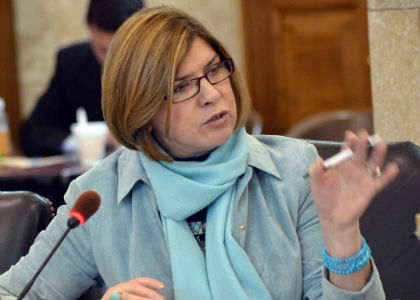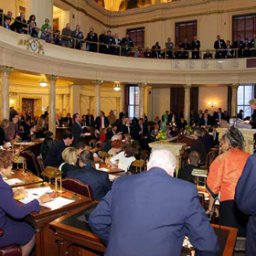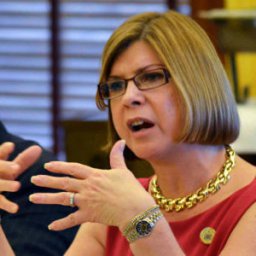
Legislation Would Place New Jersey in the Forefront of Combating Forced Servitude
TRENTON – An omnibus human trafficking bill, sponsored by Senators Nellie Pou, Joseph F. Vitale and Nia Gill, that would broaden the definition of and penalties for human trafficking, putting New Jersey in the forefront of protecting victims of sex trafficking and labor trafficking was approved today by the Senate Budget and Appropriations Committee.
“Human trafficking is an atrocious act that enslaves men, women and children right here in New Jersey,” said Senator Pou, D-Passaic and Bergen. “Often held captive by coercion, fear and abuse, these victims cannot speak against their abusers. With stricter laws, tougher penalties and with more public awareness we can put an end to this forced servitude and sex slavery that is happening within our borders.”
“Human traffickers use a variety of coercive means – whether it is physical, psychological, financial or emotional – to trap their victims. Because of this, these people are often are unable to self-identify as victims of human trafficking and the crimes committed against them go unreported,” said Senator Vitale, D-Middlesex. “By ensuring that our law enforcement and advocates have the necessary tools and training to identify cases of human trafficking, we can end the enslavement of people in New Jersey.”
“Perpetrators of sex trafficking are not being discovered, arrested and prosecuted at the level that they should be under New Jersey’s human trafficking laws,” said Senator Gill, D-Essex, sponsor of legislation making human trafficking a crime in New Jersey. “It is thought that there are thousands of human trafficking victims in New Jersey – the majority of whom are women and children who often have language and cultural barriers that prohibit them from speaking out against their abusers. By training those within our justice system and members of the community to recognize the signs of human trafficking, we can put an end to this form of slavery.”
In New Jersey, human trafficking occurs when someone knowingly holds, entices, harbors, transports, provides or obtains by any means another person to engage in sexual activity or to provide labor or services. Human traffickers use threats of serious bodily harm, physical restraint and coercion to keep their victims captive. The “Human Trafficking Prevention, Protection and Treatment Act,” S-2239, would expand the definition of human trafficking to include actions involving abduction, fraud, deceit or other deception and abuses of power as a means of accomplishing human trafficking.
The bill would expand the penalties for the crime of human trafficking by ensuring that those who are convicted of human trafficking-related crimes would be subject to a minimum fine of $25,000, which would be deposited into a newly-formed Human Trafficking Survivor’s Assistance Fund. The fund would provide assistance to victims of human trafficking and promote human trafficking awareness across the state.
Additionally the bill would expand penalties as follows:
Establish the crime of the first degree for anyone who knowingly owns, controls, manages, supervises or otherwise keeps any premises – such as a residence, apartment, hotel, motel or other lodging establishment – where human trafficking is regularly carried on, leases a premise used for human trafficking or fails to make a reasonable effort to abate this use.
Make it a crime of the first degree to knowingly publish, disseminate or display any advertisement or to knowingly purchase an advertisement for a commercial sex act depicting a minor.
Upgrade the criminal penalty for transporting a person into New Jersey to promote the person’s engaging in prostitution and for knowingly leasing a place to be regularly used for prostitution.
Establish the crime of criminal recklessness for licensed owners or drivers of commercial passenger vehicles that transport human trafficking victims.
Increase the criminal penalties for knowingly possessing or viewing any photograph, film, videotape, computer program or file, video game or any other reproduction which depicts a child engaging in a prohibited sexual act or in the simulation of such act.
The bill would also allow victims of human trafficking to seek civil damages against the perpetrators for their injuries.
The bill would create a 15-member Commission on Human Trafficking comprised of state agency officials, law enforcement, prosecutors, social service providers and advocates. Among other responsibilities, the Commission would be tasked with reviewing and evaluating current law and assistance programs and making recommendations for legislation. The Commission would report their findings to the Governor and Legislature annually.
Besides the Human Trafficking Survivor’s Assistance Fund, the bill includes numerous additional provisions to provide services for victims of human trafficking including a rehabilitative program to educate those convicted of engaging a prostitute on health risks, legal ramifications and the correlation between prostitution and human trafficking; a 24-hour hotline to report suspected human trafficking; and a program to train law enforcement, judges, hotel and motel owners and health care personnel on how to respond to and investigate human trafficking.
Due to the underground nature of human trafficking and the use of fear and abuse, self-reporting of human trafficking is extremely rare. The Senators note that a broad awareness campaign to inform and educate the public of the signs of human trafficking and to ease the reporting of trafficking, will be the most effective way to end sex and labor slavery within New Jersey. These advocacy efforts, paired with training programs for both governmental and nongovernmental organizations, will help to bring those perpetrating human trafficking-related crimes to justice.
A 2012 report by Polaris Project – a national nonprofit organization that works to prevent human trafficking and modern-day slavery – ranked New Jersey as a tier-two state in combating human trafficking, meaning that New Jersey has passed numerous laws to combat human trafficking and should take more steps to improve and implement its laws. Twenty-one states received a tier-one rating, the highest awarded by the Polaris Project.
The bill now heads to the full Senate for consideration.



